russia's crimes with a thousand-year history: how muscovy tried to appropriate Kyivan Rus
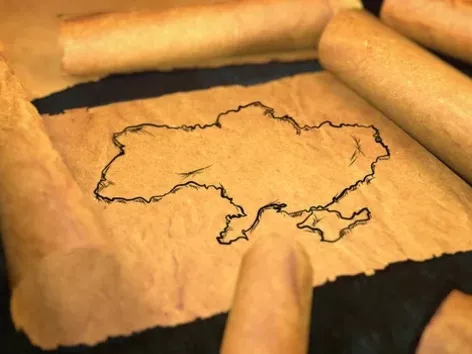
The myths spread by russia about the emergence of Ukraine have nothing to do with reality. Find out more about when Ukraine came into being and why russian federation emerged thanks to Ukrainians, and not vice versa
Despite the theses about the creation of Ukraine that the rashists are trying to propagate, once again rewriting history, the facts prove that Ukraine is a much older state than russia with a great history that the rashists do not have.
When does the history of Ukraine begin?
In short, even before the emergence of Kyivan Rus', the first associations of the ancient Slavs began to form, which are now considered to be the "prototypes of modern states" of that time. The Derevlianians, Polianians, Volynians, Dulibs, Tiverts, Uliches, Seversians and White Croats were all tribal associations that preceded the emergence of Ukraine.
How the ancient Slavic peoples lived
What is Kyivan Rus'?
To begin with, we would like to emphasize that any name has a certain origin and history, because firstly, it is just a word. So, initially, "Rus" meant "rowers", and this word is still preserved in Finnish languages. Later, the Rus' was the name of a trading corporation of that time. After that, it was the name of the people, and only later did it become the name of the state.
So, Kyivan Rus' emerged in 882, when the Rurik dynasty came from Novgorod to Kyiv. It was then that Prince Oleg proclaimed Kyiv the capital of the new state. It is an interesting fact that his predecessor, Askold, who was killed by his brother, had claimed the Kyiv principality even before Oleg.
During the almost 4 centuries of Kyivan Rus' existence (from 882 to 1240), the state went through all the stages: from formation to decline. According to Scandinavian sources, in its heyday it was called "Haidariki", which meant "the country of cities", as Kyivan Rus' was the largest among European states. Thus, there were more than 300 cities and fortresses, and the population of the capital exceeded 100,000 people, which today would be called a metropolis. For comparison, at that time, Paris had less than 50,000 inhabitants, Rome had up to 40,000, and London had less than 15,000.
Kyivan Rus
Is Kievan Rus' russia or Ukraine?
When did the moscow state appear? Yes, the first mention of moscow was found in chronicles dating back to 1147. It is important to note that at that time it was a small outskirt of the majestic Kyivan Rus'. The founder of moscow was Yuri Dolgoruky, the 6th son of Kyivan Prince Vladimir Monomakh. The city became the capital only in 1263. It is also interesting that the first attempts to occupy the rest of the territory of our state began at the end of that century. Moreover, the moscow rulers of that time quickly forgot that it was our scientific community and intelligentsia that helped them create the first legislation on the principles of statehood and the basis for the further development of cooperation between the state and the church.
So why and how did russia appropriate the history of Kyivan Rus'? It happened because the Rurik dynasty was more preserved in russia than in Ukraine. And in their usual manner, they stole the name "Rus", reworked it in their own way, and tried to take over the entire historical and cultural heritage of Ukraine.
Visit Ukraine on social media: Telegram | YouTube | Instagram | Facebook | Twitter | TikTok
What came after Kyivan Rus': indomitability and the desire for freedom
The Mongol invasion did not erase the existence of Kyivan Rus', but only modified it. Thus, for 100 years, the Halych-Volhynia principality continued the traditions of Rus', even though in 1253 our lands were proclaimed the Kingdom of russia.
After the annexation of Halych to Poland and Volhynia to Lithuania in the 1340s, the development of Ukraine's statehood did not come to a standstill, but rather continued naturally as part of the Grand Duchy of Lithuania. After all, the Kyiv and Volyn principalities retained their internal autonomy with their own traditions, culture, and even laws. And in 1569, the Ukrainian nobility played a significant role in the creation and governance of the Polish-Lithuanian Commonwealth.
At that time, the Cossacks not only became intermediaries between the Polish leadership and the Ukrainian people, but also the founders of the Zaporizhska Sich, a kind of resistance movement that did not aim to obey the authorities. By the way, the date of creation of the military center dates back to 1550, meaning that it emerged even before the establishment of the Polish-Lithuanian Commonwealth. Thus, the next page in the history of Ukraine was the Zaporizhska Army, a Cossack state founded by Bohdan Khmelnytsky.
Zaporizhska Sich
Catherine II also failed to destroy Ukrainian statehood, despite the fact that this idea is actively promoted by russian propaganda. After all, the western lands of Ukraine were able to retain their autonomy as part of Austria-Hungary. This is proved by the fact that since 1851, Chernivtsi and Lviv have had their own so-called provincial parliaments, or sejms.
It is important to note that the russian empire of that time had no such features. The first Duma (parliament) was formed there only in 1906, but it had no rights and was twice dissolved by the tsar without any reason.
1917 was the year of the proclamation of the Ukrainian People's Republic as an autonomous part of russia, and in 1918 the UPR gained full independence and international recognition. In 1919, the UPR was joined by the Western Ukrainian People's Republic, which was formed as a result of the collapse of Austria-Hungary. Unfortunately, Ukraine of that time did not stand up to the White Guards, Bolsheviks and Poles, and later a large part of its territories joined the USSR as a union republic.
Ukrainian People's Republic
Later, there were many attempts to restore independence, but they all failed:
• Carpathian Ukraine in 1939;
• the Ukrainian State on the territory of the Lviv region in 1941;
• repeated attempts by Ukrainian patriots and dissidents until the 196s.
Thus, we can see that Ukrainian statehood has suffered from russia's attempts to appropriate its name, history, territories and achievements for almost the entire period of its existence.
But Ukraine is a country of free people that has always found a way to preserve its authenticity, even when it was part of other states. Therefore, there is no doubt that the victory over the rashism invaders will be soon, and they will no longer be able to appropriate our cultural heritage or land.
We remind you! Today, the slogan "Glory to Ukraine" is heard in all corners of the world. But not everyone knows that it has a unique and interesting history. Read more about the origin of the slogan and its significance before and during the war in our article here.
You may be interested in:
Visit Ukraine Donation - make a good deed and an important contribution to the Victory of Ukraine;
Visit Ukraine Tours - the largest online database of tours to Ukraine for every taste;
Visit Ukraine Merch - choose patriotic clothing and accessories with worldwide delivery;
Visit Ukraine News - get the latest news and updates in our Telegram channel;
Cooperation - cooperation and advertising integrations with Visit Ukraine and Visit World projects.
Recommended articles
2 min
War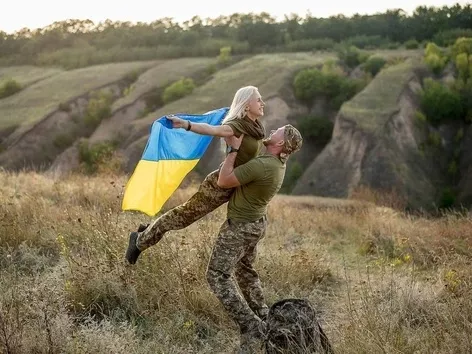
Love on the frontline is a new reality in Ukraine: stories of the military
With the start of the full-scale invasion, everyone had to adapt to the new realities. But even the war did not become an obstacle to true love. Here are the incredible love stories of the military
13 May. 2023
More details3 min
Way to Victory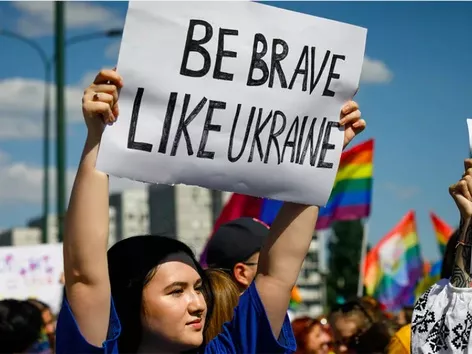
The phenomenon of Ukrainian resilience: what helps the people of Ukraine to fight unbreakably
Unfortunately, war leaves an irreparable mark on the psyche of every person. Find out more about how and why Ukrainians continue to persevere despite the constant threat of russia's armed aggression
14 May. 2023
More details2 min
Way to Victory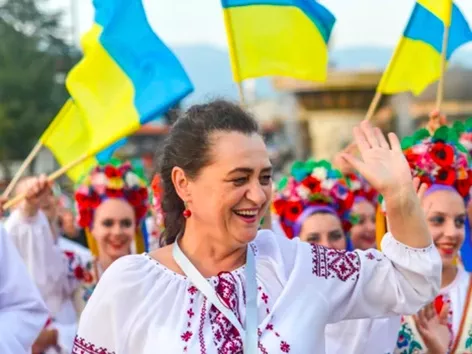
How many Ukrainians believe in victory by 2024: survey results
Predictions from experts and the military about when the war will end vary. Find out more about the percentage of Ukrainian citizens who believe that the war will end with our victory by 2024
15 May. 2023
More details1 min
War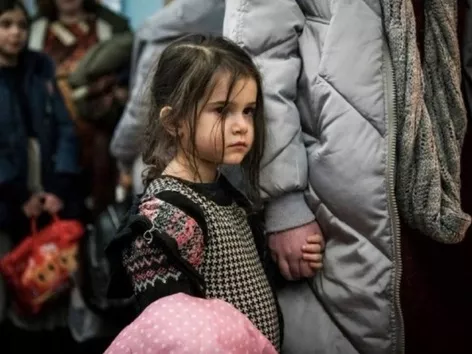
International Day of the Family: What trace the war leaves in the hearts of Ukrainians
Today, on May 15, Ukrainians mark the International Family Day on their calendars. Unfortunately, for the second year in a row, this holiday has been very painful for our citizens. Find out more about how the realities of war have affected Ukrainian families who have lost their homes and their normal lives
15 May. 2023
More details

